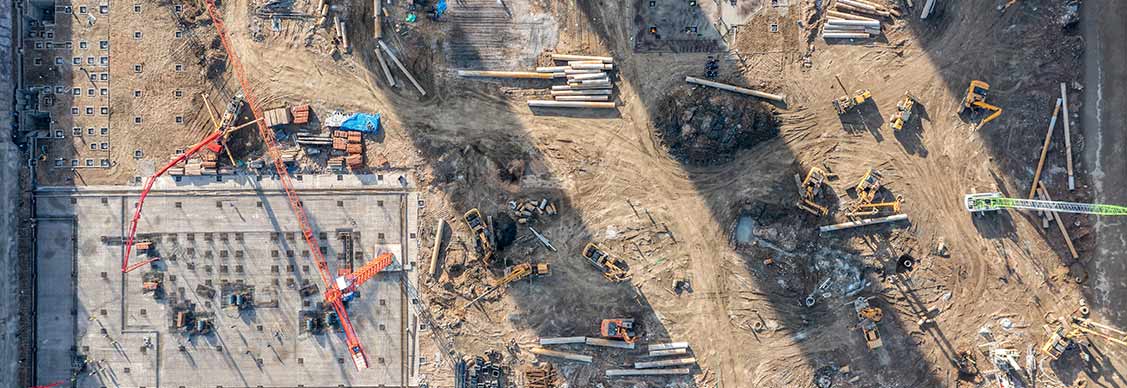Navigating inflation in the construction industry
Real estate insights by Laura Morgan, Market Intelligence Lead MEA
With the ever-rising costs of goods and services, inflation has invariably impacted the construction sector globally. High inflation occurs due to various factors, with ‘demand-pull’ and ‘cost-push’ as two root causes. In the construction industry, it is primarily 'cost-push' inflation – when the increased costs of raw material and skilled labour lead to a reduced supply of goods and services. Consequently, construction projects become more expensive, affecting budgets and timelines.
Historically, inflation has affected the construction industry both positively and negatively. Real estate stocks and properties tend to appreciate in line with inflation, leading to positive returns. Inflation can help reduce the actual value of debt over time, making loan and mortgage repayment easier. In some cases, salaries are increased to match the rising cost of living, thereby lifting people's purchasing power.
Nevertheless, accurate data on inflation is crucial for informed decision-making, but there has been a shortage of reliable data in the industry. To address this issue, JLL began analysing the market and assessing tender price inflation to help clients strategise their approaches. Regularly identifying and tracking critical rates on construction projects gives us a better understanding of available data and its movements. For example, monitoring commodity prices like oil and metals using the World Bank's monthly announcements has proven helpful in analysing market trends.
What are the key risks driving up construction costs?
To establish trends and mitigate the impact of inflation, JLL gathers insights on various factors, including currency fluctuations and devaluation, the global shipping index, inflation and interest rates, energy and fuel prices, supply chain adjustments, skilled labour demand, market confidence and more. For instance, monitoring the World Steel Association's predicted demand across key regions helps to gauge global demand and its impact on the Middle East region.
JLL's surveys conducted in 2022 and 2023 reveal a shift in the perception of inflation as a major risk. In recent years inflation has not always been a significant cause for concern, however, driven by market trends following the pandemic, we are now seeing and hearing the complete opposite. Inflation is a key topic of conversation we are frequently having with our clients.
The pandemic-induced disruptions have significantly affected construction costs, particularly commodity prices and supply chains. We saw a significant price peak in commodity supply following the impact and headwinds caused by geopolitical tensions in Eastern Europe. There has been a shortage of skilled labour globally. In addition, the cost of construction materials and their transportation has been experiencing a rising trend. The global economic impact can be seen in the Middle East as well.
Mechanisms to alleviate inflation risk
Considering proper risk allocation to project design during the pre-qualification tender process is crucial. Unrealistic or tight project durations often result in accelerated costs. By following the following steps, project owners can address the challenge considerably.
- Local sourcing of materials
Consider local sourcing of products and materials whenever possible to alleviate inflated import prices and costs. This way, we can also address the challenge of currency fluctuations and delays. Positive feedback from clients and contractors emphasises the reliance on local sourcing wherever, which can offer a broader range of materials, improve supply chain efficiency,lead times and and associated carbon footprint. Additionally, by encouraging the drive for locally sourced materials, shall in turn support local manufacturing growth here in the UAE and regionally.
- Market stability
Monitor the market and price stability trends to assess costs accurately and avoid unexpected fluctuations. By understanding market trends, project owners can make informed decisions and minimise financial risks associated with volatile prices. Accounting inflation as a risk should continue to be part of construction project budgets.
- Robust pre-qualification process
Allow sufficient time for tender preparation, ensuring contractors have enough time to scope the complexities of a project and provide solid and competitive proposals. Unrealistic or tight project durations and rushed procurement processes can accelerate costs and compromise project quality, so proper time allocation is essential.
- Competitive tender environment
Align the contractor tender list with the project’s size, value and complexity based on pre-qualification analysis. Ensure that the selected contractors are able to estimate the complete design accurately, reducing the risk of cost-related issues during project execution. Early contractor engagement can be beneficial and compliment complex construction projects.
- Effective risk allocation
The effective allocation of risk between parties of construction contracts, can alleviate cost pressures in the overall contract price, any additional or unnecessary risk imposed on contractors can attract a greater cost premium. Effective risk management for the duration of projects supported by adequate financial safeguarding will provide a level of comfort throughout the project program. This along with working with the wider project team and key stakeholders to mitigate identified risks will soften the burden of anticipated risks.
- Value management studies
Conducting value management studies at the earliest stages of design is recommended to guide the design process and benefit the project budget. Practising this reduces the reliance on value engineering studies at later stages, which can make it more challenging to identify and implement value engineering options.
Inflation remains a challenge for the construction industry, impacting projects worldwide. To effectively navigate this challenge, industry professionals must understand the causes of inflation, identify key risks driving up construction costs, and implement appropriate mitigation strategies. By considering local sourcing of materials, ensuring market stability, and adopting best practices in tender processes and risk management, construction professionals make concise recommendations to clients supporting the financial success of their projects.
